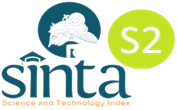Penerapan Blended Learning dengan Pendekatan STEM untuk Meningkatkan Literasi Sains dan Kemampuan Kognitif Siswa SMA
DOI:
https://doi.org/10.33477/bs.v11i2.3644Abstract
Blended learning is a mixed learning model between face-to-face and online learning. The purpose of this study was to determine the influence and magnitude of the influence of the application of STEM-based blended learning on increasing scientific literacy and cognitive abilities and the responses of class XII students at SMA Negeri 11 Ambon in the new normal period. The type of research used was a pre-experimental design with one group pretest-posttest. The research was conducted at SMA Negeri 11 Ambon from December 2021 to January 2022. The research subjects were 36 students in class XII MIA-4 in the 2021-2022 academic year. The results showed that there was an effect of applying blended learning with the STEM approach to increasing scientific literacy and students' cognitive abilities. The average scientific literacy ability of students from the application of blended learning with the STEM approach has a percentage of 86.53% in the very high category, while students' cognitive abilities obtained an average N-gain value of 67.48% indicating that the use of blended learning models with the STEM approach is quite effective for improving cognitive outcomes in class XII students of SMA Negeri 11 Ambon.
Keywords: Blended Learning, STEM, Literacy, Cognitive
References
Borup, J., Chambers, C., & Srimson, R. (2019). Online teacher and on-site facilitator perceptions of parental engagement at a supplemental virtual high school. International Review of Research in Open and Distance Learning, 20(2). https://doi.org/10.19173/irrodl.v20i2.4237
Ceylan, S., & Ozdilek, Z. (2015). Improving a Sample Lesson Plan for Secondary Science Courses within the STEM Education. Procedia - Social and Behavioral Sciences, 177. https://doi.org/10.1016/j.sbspro.2015.02.395
Creswell, J. W., & Creswell, J. D. (2014). Research and Design Qualitative, Quantitative and Mixed Methods Approaches. Thousand Oaks California.
Daugherty, M. K. (2013). The Prospect of an “A” in STEM Education. Journal of STEM Education: Innovations and Research, 14(2).
Dhawan, S. (2020). Online Learning: A Panacea in the Time of COVID-19 Crisis. Journal of Educational Technology Systems, 49(1). https://doi.org/10.1177/0047239520934018
Fitriyani, Y., Fauzi, I., & Sari, M. Z. (2020). MOTIVASI BELAJAR MAHASISWA PADA PEMBELAJARAN DARING SELAMA PANDEMIK COVID-19. Profesi Pendidikan Dasar, 7(1), 121–132. https://doi.org/10.23917/ppd.v7i1.10973
Hidayati, L., Amalyaningsi, R., Ningrum, W. A., Nurhayati, U., & Wakhidah, N. (2022). Respon Peserta Didik Terhadap Penerapan Model Pembelajaran Hybrid Learning di MTs Negeri 2 Sidoarjo. PENSA E-JURNAL:Pedidikan Sains, 10(1), 155–160. https://ejournal.unesa.ac.id/index.php/pensa
Lestari, H. (2020). Literasi Sains Siswa Melalui Penerapan Model Pembelajaran Blended Learning Dengan Blog. NATURALISTIC : Jurnal Kajian Penelitian Pendidikan Dan Pembelajaran, 4(2b). https://doi.org/10.35568/naturalistic.v4i2b.769
Lestari, H., Banila, L., & Siskandar, R. (2019). Improving Student’S Science Literacy Competencies Based on Learning Independence With Stem Learning. … : Jurnal Biologi Dan …, 14(2), 18–23. http://jurnal.untirta.ac.id/index.php/biodidaktika/article/view/6134%0Ahttps://jurnal.untirta.ac.id/index.php/biodidaktika/article/download/6134/4331
Lestari, H., & Siskandar, R. (2020). Cultivating Green Behavior of Eco Literation-Based Elementary School Students during the COVID-19 Pandemic. Jurnal Penelitian Pendidikan IPA, 7(1). https://doi.org/10.29303/jppipa.v7i1.477
Lestari, H., & Widodo, A. (2021). Peranan Model Pembelajaran Nature Of Sains Terhadap Peningkatan Pemahaman Sains Siswa Di Sekolah Dasar. Jurnal Cakrawala Pendas, 7(1). https://doi.org/10.31949/jcp.v7i1.2425
Pramesti, N. M. G. A., & Harimurti, R. (2016). Pengaruh penerapan model pembelajaran blended learning untuk meningkatkan aktivitas belajar siswa kelas X TKJ. It-Edu, 1(02), 76–81. https://jurnalmahasiswa.unesa.ac.id/index.php/it-edu/article/view/17988
Purwanto. (2013). Evaluasi Hasil Belajar. Pustaka Pelajar. Jakarta
Purwanto, N. (2006). Prinsip-prinsip dan Teknik Evaluasi Pengajaran (Ke13 ed.). Remaja Rosdakarya.
Richardson, J. W., Lingat, J. E. M., Hollis, E., College, R., & Pritchard, M. (2020). Shifting teaching and learning in online learning spaces: An investigation of a faculty online teaching and learning initiative. Online Learning Journal, 24(1). https://doi.org/10.24059/olj.v24i1.1629
Sadler, T. D., & Zeidler, D. L. (2009). Scientific literacy, PISA, and socioscientific discourse: Assessment for progressive aims of science education. Journal of Research in Science Teaching, 46(8). https://doi.org/10.1002/tea.20327
Sopandi, W. (2019). Sosialisasi dan Workshop Implementasi Model Pembelajaran RADEC Bagi Guru-Guru Pendidikan Dasar dan Menengah. Pedagogia : Jurnal Pendidikan, 8(1), 19–34. https://doi.org/10.21070/pedagogia.v8i1.1853
Suwarna. (2016). Materi untuk Ujian Kepribadian Kepala Sekolah Berprestasi. Dinas Dikpora Yogyakarta.
Yuliati, Y. (2017). LITERASI SAINS DALAM PEMBELAJARAN IPA. Jurnal Cakrawala Pendas, 3(2). https://doi.org/10.31949/jcp.v3i2.592
Downloads
Published
Issue
Section
License
Authors who publish with this journal agree to the following terms: Authors retain copyright and grant the journal right of first publication with the work simultaneously licensed under a Creative Commons Attribution License that allows others to share the work with an acknowledgement of the work's authorship and initial publication in this journal. Authors are able to enter into separate, additional contractual arrangements for the non-exclusive distribution of the journal's published version of the work (e.g., post it to an institutional repository or publish it in a book), with an acknowledgement of its initial publication in this journal. Authors are permitted and encouraged to post their work online (e.g., in institutional repositories or on their website) prior to and during the submission process, as it can lead to productive exchanges, as well as earlier and greater citation of published work.














